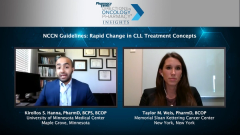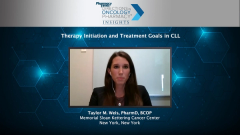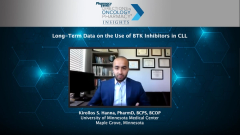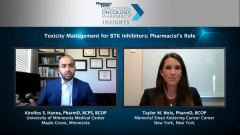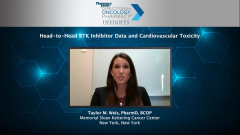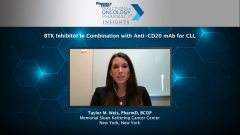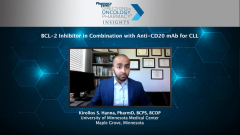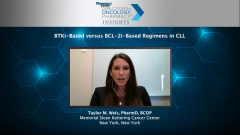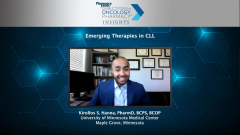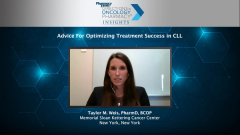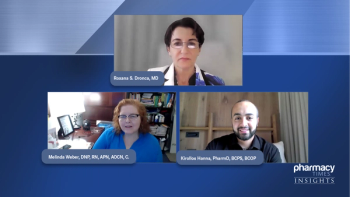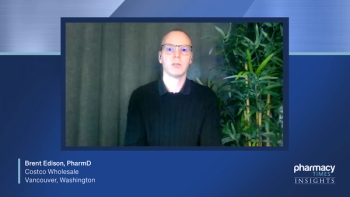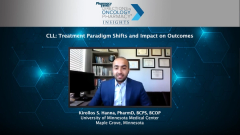
Long-Term Data on the Use of BTK Inhibitors in CLL
A review of long-term efficacy and safety data on the use of BTK inhibitor monotherapy in the frontline setting, plus insights from clinical practice.
Episodes in this series

Kirollos S. Hanna, PharmD, BCPS, BCOP: I think one of the biggest things we have to focus on is BTK [Bruton tyrosine kinase] monotherapy for frontline CLL [chronic lymphocytic leukemia]. When ibrutinib first came on board, it changed this landscape. But now, what’s really exciting is that we’re starting to see reports of long-term follow-up. With the BTK inhibitors, we have ibrutinib, acalabrutinib, and even zanubrutinib is trying to move into the space and is in the NCCN [National Comprehensive Cancer Network] guidelines, the most recent updates. We wanted to know, since this is now the preferred method, how are patients doing long term? Thus, I think what we saw, out of ASCO [American Society of Clinical Oncology annual meeting] this year, we saw some really exciting abstracts presented.
One of the most notable trials we’ve had in the patient population with CLL is RESONATE-2. We learned a lot from the RESONATE-2 trial, and what we saw presented was follow-up at around 6-and-a-half or 7 years or so. Now, it’s interesting because when we look at these specific trials that are comparing ibrutinib to standard chemotherapy, chlorambucil, which we really don’t use nowadays, we’re still seeing that there are many patients on BTK inhibition who have done well this far out. Looking at the long-term data reported at ASCO from the RESONATE-2 trial, they saw that the progression-free survival [PFS] was still 61% in patients treated with ibrutinib currently versus 9% in those treated with chlorambucil. What is that, almost 6 times more in terms of a PFS benefit. Also, this PFS benefit was not only observed in select groups, this was observed across all subgroups. Thus, IGHV, regardless of the mutation status, regardless oftheir cytogenetics, deletion 11q, deletion 17p. And the overall survival at this 6-and-a-half, 7-year mark was around 80% in the patients treated with ibrutinib.
I think this is very notable because, again, outside of the mutated IGHV status, when we talk about chemoimmunotherapy there, we don’t see survival upward of 80%, and we haven’t seen that historically prior to the advent of BTK inhibitors. Hence, seeing this prolonged benefit is very impressive. As you said earlier Dr Weis, this is a disease of the elderly, where many of our patients are diagnosed probably in their 60s or so, and we’re able to extend their life by 7 to 10 years. Now, what we’re starting to see in the CLL, SLL [small lymphocytic lymphoma] population is that many patients are starting to succumb due to older age and comorbidities, not so much from the CLL itself, which is super exciting.
However, another thing we wanted to look at was the rates of adverse events [AEs]. We know that with BTK inhibitors, one big conversation of interest is always off-target kinase activity. The claim to fame between them and all this competition we’re seeing between ibrutinib, acalabrutinib, and zanubrutinib is, “I’m a safer BTK inhibitor than you, I have less off-target kinase activity than you.” That leads us to discuss toxicities of interest. These are going to be around hypertension, atrial fibrillation, cytopenias, headaches, as well as numerous other things that we see with these medications. But the great thing that we also saw from the extended outcome data from the RESONATE-2 trial is that rates of grade 3 or worse adverse events continued to be low at 7 years. Thus, there was no trend demonstratingthat one AE worsened with time, which was really exciting. And most AEs that led to a [dose] reduction either resolved or improved with time. So there was some type of intervention. Obviously in CLL we dose patients on ibrutinib at 420 mg daily. They were dose reduced to maybe 280 mg or 140 mg or something, and they began to see a resolution or a complete improvement. Thus, it was well tolerated. There were no new safety signals with these long-term data.
Also, looking at this a little further, the RESONATE-2 again was one of the pivotal trials. But also looking at the phase 1b/2 trial, the PCYC-1102 study, thisalso reported 8-year follow-up. This was looking at both patients with frontline CLL or SLL as well as relapsed/refractory, and these patients ultimately received ibrutinib. The 8-year data that were reported out of this, I’m not going to go too much into the specifics for the sake of time, but these data also supported the long-term outcomes we saw from RESONATE-2, including all the risk groups. In the high-risk CLL/SLL population, maybe those with deletion 17p, maybe those with the IGHV unmutated status, we still saw sustained benefits.
I think there is another notable trial that we have to mention. It’s not always about ibrutinib, although ibrutinib has been the longest BTK on the block. There was the phase 2 study of acalabrutinib…reported at ASCO [American Society of Clinical Oncology annual meeting] 2020. Acalabrutinib, although it was the newer BTK or more novel BTK inhibitor to come into the space and have FDA approval, the phase 2 trial, ACE-CL-001, looked at patients with CLL who were treatment naïve, and we saw mature results reported from this study. Ultimately, we’re not going to have long-term data as we do with ibrutinib yet, just because acalabrutinib hasn’t been around in this space as long. But at 53 months follow-up, it demonstrated a very similar efficacy benefit. Also, discontinuations due to an AE happened in very few patients, and a small handful of patients [had to discontinue the drug] due to progressive disease such as a Richter transformation, and things of that sort.
I wanted to get your opinion, Dr Weis, as it relates to clinical practice. Are you seeing from your clinical practice, patients on these BTK inhibitors for this long? Are you seeing sustained benefits this long, or are you seeing something a little different? Are you seeing more adverse events that are leading to discontinuations, having to switch, or would you say clinical practice is aligning with these controlled studies?
Taylor M. Weis, PharmD, BCOP: I would say clinical practice is aligning with these controlled studies.We have patients who are on ibrutinib or acalabrutinib for several years and doing well. We are kind of a unique center. We get a lot of referrals from other hospitals and other cancer centers as well, so we often do get patients with complicated cases who have had multiple therapies and failed multiple therapies. I would say our clinic is a mix of these patients, but the patients who we start on ibrutinib or other BTK inhibitors up front are doing very well and do seem to be feeling better. One of the things that is encouraging from these studies; honestly, when these studies were first coming out, it was a little bit concerning when you’d see the overall response rates. Even when we saw the first randomized controlled trials of ibrutinib versus FCR [fludarabine, cyclophosphamide, rituximab] or BR [bendamustine plus rituximab], the overall response rates were actually lower than standard chemoimmunotherapy. We’re talking so much about the importance of MRD [minimal residual disease] and getting really deep remissions, but what we’re seeing is that a lot of these patients on BTK inhibitors are getting partial responses or stable disease. However, they’re still having really long remissions. What we’ve also been seeing from these long-term follow-up studies is that these remissions deepen over time, which is even more encouraging that these patients will be able to stay on these therapies for many more years to come.
Transcript edited for clarity.
Newsletter
Stay informed on drug updates, treatment guidelines, and pharmacy practice trends—subscribe to Pharmacy Times for weekly clinical insights.

